Input interpretation

deuterated acetic acid (D4)
Chemical names and formulas
![formula | CD_3CO_2D Hill formula | C_2D_4O_2 name | deuterated acetic acid (D4) IUPAC name | 2, 2, 2-trideuterioacetic acid deuterio ester alternate names | 2, 2, 2-trideuterioacetic acid deuterio ester | [2H3]acetic [2H]acid | acetic acid-d4 | acetic-d3 acid-d | deuterio 2, 2, 2-trideuterioacetate | deuterio 2, 2, 2-trideuterioethanoate | tetradeuteroacetic acid mass fractions | O (oxygen) 0.499% | C (carbon) 0.375% | H (hydrogen) 0.126%](../image_source/a286d45be21789443dd3bdb1f867a107.png)
formula | CD_3CO_2D Hill formula | C_2D_4O_2 name | deuterated acetic acid (D4) IUPAC name | 2, 2, 2-trideuterioacetic acid deuterio ester alternate names | 2, 2, 2-trideuterioacetic acid deuterio ester | [2H3]acetic [2H]acid | acetic acid-d4 | acetic-d3 acid-d | deuterio 2, 2, 2-trideuterioacetate | deuterio 2, 2, 2-trideuterioethanoate | tetradeuteroacetic acid mass fractions | O (oxygen) 0.499% | C (carbon) 0.375% | H (hydrogen) 0.126%
Lewis structure
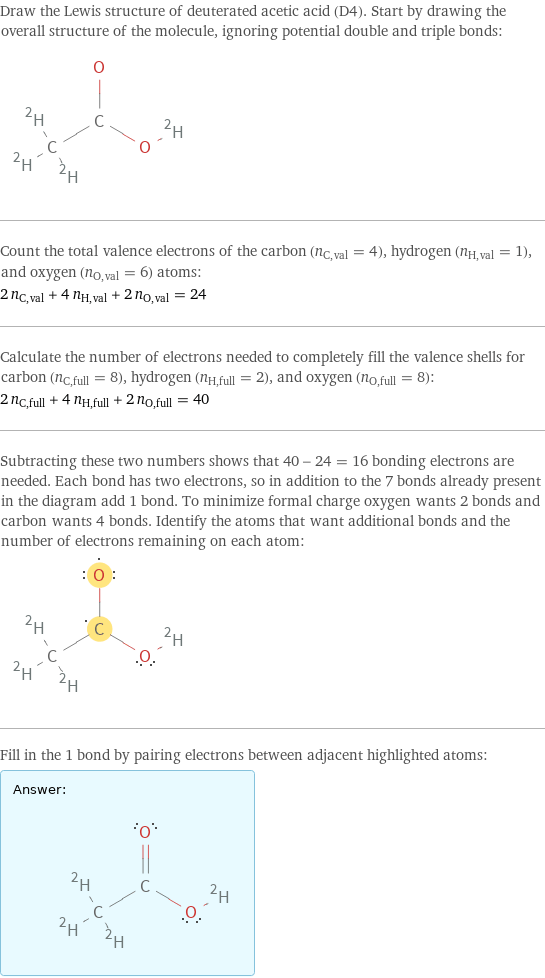
Draw the Lewis structure of deuterated acetic acid (D4). Start by drawing the overall structure of the molecule, ignoring potential double and triple bonds: Count the total valence electrons of the carbon (n_C, val = 4), hydrogen (n_H, val = 1), and oxygen (n_O, val = 6) atoms: 2 n_C, val + 4 n_H, val + 2 n_O, val = 24 Calculate the number of electrons needed to completely fill the valence shells for carbon (n_C, full = 8), hydrogen (n_H, full = 2), and oxygen (n_O, full = 8): 2 n_C, full + 4 n_H, full + 2 n_O, full = 40 Subtracting these two numbers shows that 40 - 24 = 16 bonding electrons are needed. Each bond has two electrons, so in addition to the 7 bonds already present in the diagram add 1 bond. To minimize formal charge oxygen wants 2 bonds and carbon wants 4 bonds. Identify the atoms that want additional bonds and the number of electrons remaining on each atom: Fill in the 1 bond by pairing electrons between adjacent highlighted atoms: Answer: | |
3D structure
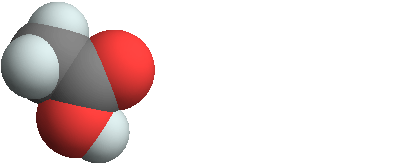
3D structure
Basic properties
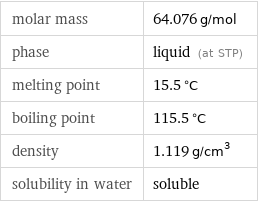
molar mass | 64.076 g/mol phase | liquid (at STP) melting point | 15.5 °C boiling point | 115.5 °C density | 1.119 g/cm^3 solubility in water | soluble
Units

Liquid properties (at STP)
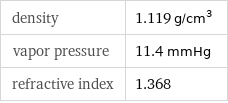
density | 1.119 g/cm^3 vapor pressure | 11.4 mmHg refractive index | 1.368
Units

Non-standard atom properties

H-2 | 4
Chemical identifiers
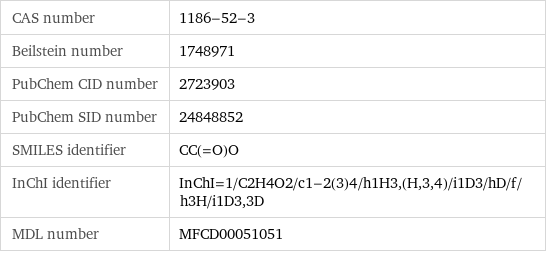
CAS number | 1186-52-3 Beilstein number | 1748971 PubChem CID number | 2723903 PubChem SID number | 24848852 SMILES identifier | CC(=O)O InChI identifier | InChI=1/C2H4O2/c1-2(3)4/h1H3, (H, 3, 4)/i1D3/hD/f/h3H/i1D3, 3D MDL number | MFCD00051051
NFPA label

NFPA label
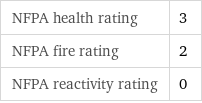
NFPA health rating | 3 NFPA fire rating | 2 NFPA reactivity rating | 0
Safety properties
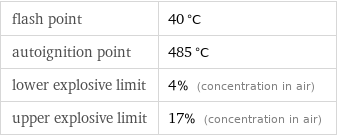
flash point | 40 °C autoignition point | 485 °C lower explosive limit | 4% (concentration in air) upper explosive limit | 17% (concentration in air)

DOT numbers | 2789